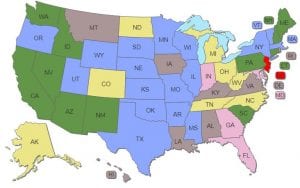 Raw milk laws differ from state to state, due in part to the federal ban on the interstate transport of raw milk for human consumption. This raw milk map reflects the statutes, regulations, and court cases in effect as of January 1, 2018.
Raw milk laws differ from state to state, due in part to the federal ban on the interstate transport of raw milk for human consumption. This raw milk map reflects the statutes, regulations, and court cases in effect as of January 1, 2018.
Note that the question of whether a state’s residents have access to raw milk may or may not correspond well to the published law. For example, while the retail sale of raw milk is legal in Nevada under statute, the requirements for selling it are such that there is no licensed raw milk dairy in the state. In addition, in some states where there are no laws on herd shares, the state agencies actively seek to close down herd shares; while in other states with an identical lack of law, the agencies are currently choosing not to pursue known herd shares. This map should therefore be used for general informational purposes only.
The map indicates the most permissive category for obtaining raw milk in each state. Please see the chart below the map for a more detailed look at how raw milk can legally be obtained in your state.
Major changes since the prior version of the raw milk map are:
- Nevada has been reclassified as a “Retail store sales legal” state rather than a “Raw milk sales illegal” state because the statute does allow retail sales of raw milk. Note that the law requires that the facility be certified by a county milk commission, creating significant local challenges.
- Iowa, Louisiana, Delaware, Hawaii, and Rhode Island have been reclassified from “Raw milk sales illegal” states to “No law on herdshares,” since they do not have laws that specifically prohibit herd shares. Enforcement attitudes by the state agencies differ in these states.
- Indiana has changed from a “No law on herdshares” state to a “Sale for pet food legal” only state. There has been no change in Indiana on herdshare law, but it has been confirmed that pet food sales are legal, so farmers/producers may use either method.
- North Carolina was previously marked as a “Sale for pet food legal” only state, but in 2018 passed a statute which expressly permits raw milk through herdshares.
- Montana continues to be marked as “No law on herdshares;” however, there is an agreement in place between the Department of Livestock and the Secretary of State’s office that if a producer registers their animal or herd as a security and complies with the requirements for the sale of such, that the Department of Livestock will not prosecute for raw milk obtained through the sale of a security.
For states that still have a lack of access, or that have laws which give access in name only, the progress may seem slow, but nationally we can see progress: the vast majority of the states in the nation allow access to raw milk in one form or another, which wasn’t the case just two decades ago.
If you have questions about the laws applicable to you in your state, you should consult with a licensed attorney. Farm-to-Consumer Legal Defense Fund (FTCLDF) members: you are welcome to contact FTCLDF concerning laws that apply to your farm.
View the Raw Milk Map and Chart.
YOUR FUND AT WORK
Services provided by FTCLDF go beyond legal representation for members in court cases.
Educational and policy work also provide an avenue for FTCLDF to build grassroots activism to create the most favorable regulatory climate possible. In addition to advising on bill language, FTCLDF supports favorable legislation via action alerts and social media outreach.
If you’d like to make a contribution to support the work of FTCLDF, donate/find out more or join us today!